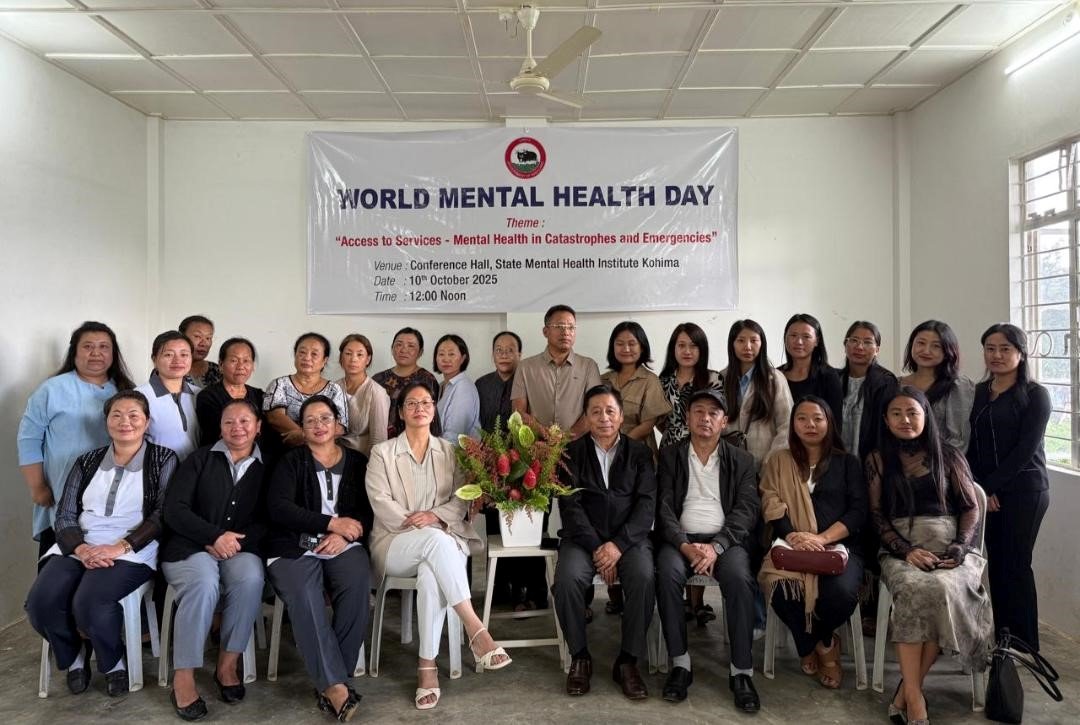World Mental Health Day was observed on October 10 at the Conference Hall of the State Mental Health Institute Kohima (SMHIK) under the theme “Access to Services – Mental Health in Catastrophes and Emergencies.”
Addressing the event, Dr. Nuvotso Khesoh, Senior Medical Officer, underscored the importance of prioritising mental health during disasters, conflicts, and crises, stating that mental health does not take a back seat during emergencies—it becomes more vulnerable, more fragile, and more critical.
Speaking on the theme, Dr. Khesoh highlighted that in the aftermath of disasters—whether natural calamities such as floods, earthquakes, and cyclones, or human-made crises like conflict, displacement, and pandemics—the physical damage is often visible, but the psychological wounds of trauma, grief, anxiety, and despair linger far longer. He noted that nearly everyone in crisis-affected populations experiences emotional distress, with many developing diagnosable mental health conditions. Those already living with such conditions, he said, face greater risks due to disrupted access to medication, treatment, and support networks.
He emphasised that while emergency responses typically focus on food, water, shelter, and medical care, mental health and psychosocial support (MHPSS) are equally life-saving interventions. He outlined key areas such as immediate psychological first aid, screening and early intervention for high-risk groups, ensuring continuity of care, and mobilising community-based support systems. Training frontline workers and volunteers to recognise mental distress and provide referrals was also identified as an essential step in strengthening resilience.
“When mental health is integrated into emergency response from day one, we not only reduce suffering but also strengthen communities to rebuild more robustly,” he stated.
Dr. Khesoh also drew attention to ongoing challenges such as limited resources, damaged infrastructure, shortage of trained professionals, stigma, poor access in remote areas, and weak coordination among agencies. He observed that long-term mental health support is often neglected once the immediate crisis passes.
Calling for local action, he suggested several steps that can be implemented at the institutional and state levels. These include developing disaster-ready mental health plans, expanding mobile and tele-mental health services, building local capacity through training, and engaging communities in awareness campaigns.
Download Nagaland Tribune app on Google Play

He further urged partnerships with NGOs, government bodies, schools, and faith-based organisations to strengthen mental health preparedness and advocated for greater policy attention and budget allocation for crisis mental health care. “Let us view disasters not just as challenges but as opportunities to strengthen our mental health systems,” he said.
Addressing survivors and care seekers, Dr. Khesoh reminded that psychological distress is a natural response to abnormal events, assuring that healing is possible through compassion, connection, and professional support. “Even in the worst crises, small acts of empathy—listening, caring, and reaching out—can become anchors of hope,” he remarked, urging communities to reduce stigma and support one another.
Furthermore, Dr. Khesoh affirmed that mental health is “not a luxury but a lifeline” in times of catastrophe, adding, “In our darkest hours, what we need most is a hand to hold, a listening ear, and the knowledge that help is there.”
The programme was chaired by Dr. Tiakala Walling, SMO, SMHIK. The welcome address was delivered by Dr. Khriesilie Sachu, Medical Superintendent, SMHIK. A special song was presented by Shurhosienuo Belho, Staff Nurse, and the vote of thanks was proposed by Manon Konyak, PSW, Tele-Manas Cell.

